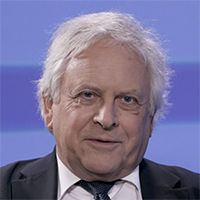Dear colleagues, I am Christoph Diener, a neurologist from the University Hospital in Essen, Germany. Today I will cover a few studies that were presented at the 4th European Stroke Organisation Conference (ESOC) in Gothenburg.
WAKE-UP Trial
I would like to start with acute stroke. The results of the long-awaited WAKE-UP stroke study[1] were presented. This was a study in patients who had a stroke with unknown onset who immediately received MRI. Patients were recruited if there was a lesion on MRI with diffusion-weighted imaging but no hyperintensity on fluid-attenuated inversion recovery (FLAIR) imaging. This kind of pattern would indicate that the onset of stroke was within the previous 4.5 hours. Patients were treated with either recombinant tissue plasminogen activator (rTPA) or with placebo; the primary endpoint was modified ranking 0 or 1 [on the Rankin scale of neurologic disability], reflecting a full recovery.
Patients were 65 years old on average. There were 254 patients in the rTPA group and 249 patients in the placebo group; 90% of all patients suffered a stroke while asleep.
The primary endpoint of favorable outcome at 90 days was achieved in 53.3% in the rTPA group and 42% in the placebo group. The odds ratio was 1.61, which was statistically significant. As you would expect, there was a higher risk of bleeding in people on rTPA. Five patients on rTPA and one patient in the placebo group had a symptomatic intracranial hemorrhage. Mortality was slightly higher in the rTPA group at 90 days.
This study clearly shows that rTPA can be used in patients with wake-up stroke, but on the condition that there is immediate availability of an MRI to show that there is penumbra and that most probably the stroke happened within the past 4.5 hours.
POINT Trial
Let's move to secondary stroke prevention. A study done in China, the CHANCE trial,[2] looked at 30 days of combined aspirin plus clopidogrel compared with aspirin in patients with transient ischemic attack (TIA) or minor strokes. This study was now replicated as the POINT study.[3] The POINT study in maturity had Caucasian patients. In this study, 2432 patients treated for 90 days with clopidogrel plus aspirin with a loading dose of clopidogrel were compared with 2449 patients on aspirin. Patients had either a high-risk TIA or a minor stroke and were 65 years old on average.
The outcomes were ischemic stroke, myocardial infarction, and vascular death. This occurred in 6.5% in the aspirin group and 5.0% in the clopidogrel-plus-aspirin group. This was an absolute benefit of 1.5% with a hazard ratio (HR) of 0.75, which was statistically significant. As you would expect with combination therapy, there was a higher risk of bleeding with 0.9% over 90 days with combination therapy compared with 0.4% with aspirin monotherapy, reflecting an HR of 2.32.
If we look at other endpoints, there was a statistically significant benefit for ischemic stroke, and a significant downside of aspirin plus clopidogrel was major hemorrhage. The absolute difference for the primary efficacy endpoint was 39 patients who benefited from the therapy, and 13 more patients had a major bleed. If we calculate numbers-needed-to-treat, treating 1000 patients with combination aspirin and clopidogrel therapy would prevent 15 recurrent strokes and the cost would be five more major bleeds.
If we look at the Kaplan-Meier curves, it immediately is evident that basically everything happened in the first 10 days; [that is when] there is the highest benefit. In practical terms, it makes sense to use combination therapy for between 10 and 14 days and then continue monotherapy with aspirin or clopidogrel.
NAVIGATE ESUS Trial
Another long-awaited study was the NAVIGATE ESUS study[4] in patients with embolic stroke of undetermined source. These are patients who have no lacunar stroke, no cardiac source of embolism, and no rare cause of stroke. The presumed mechanism of stroke is embolic. In this study, patients were randomized either to low-dose rivaroxaban or aspirin.
In terms of efficacy, which was recurrent stroke or systemic embolism, there was unfortunately no benefit of rivaroxaban over aspirin. The study was large enough, with 3600 patients in each group. There was an increased risk of bleeding with rivaroxaban over aspirin (HR, 2.72) and this was also true for symptomatic intracranial hemorrhage, occurring in 20 patients in the rivaroxaban group compared with five in the aspirin group.
Unfortunately, this trial was negative. The RE-SPECT ESUS trial, which compares dabigatran according to bleeding risk with aspirin, is still ongoing.
TICH-2 Trial
Finally, let's discuss cerebral bleeds. The long-awaited results from the TICH-2 study[5] were presented. This is tranexamic acid for hyperacute spontaneous intracerebral hemorrhage. We have evidence from posttraumatic hemorrhage that this treatment might work.[6] Patients with traumatic hemorrhage and anticoagulation-induced hemorrhage were excluded.
Patients received 1 g of tranexamic acid as a bolus followed by a [1 g] infusion over 8 hours, and the inclusion time was 8 hours. Altogether, 2325 patients participated. The primary endpoint was a shift analysis of the modified Rankin Scale at 90 days. Unfortunately, the study was negative for the primary but also for all secondary endpoints. This is another study which does not show that the medical treatment of intracerebral hemorrhage is effective. This has already been shown, unfortunately, for factor VII.[7]
Ladies and gentlemen, there was lots of excitement at the ESOC Congress in Gothenburg. We saw positive trials and, unfortunately, negative trials.
I am Christoph Diener from the University Hospital in Essen, Germany. Thank you for watching and listening.
Medscape Neurology © 2018 WebMD, LLC
Any views expressed above are the author's own and do not necessarily reflect the views of WebMD or Medscape.
Cite this: Hans-Christoph Diener. Stroke Trials at ESOC 2018: 'Lots of Excitement' - Medscape - Aug 24, 2018.













Comments